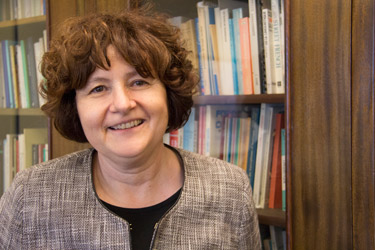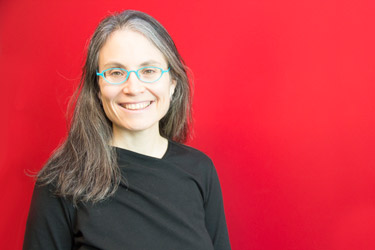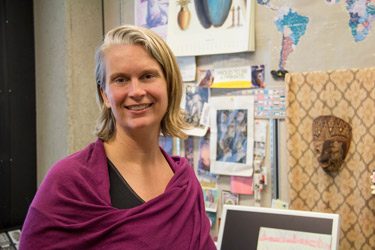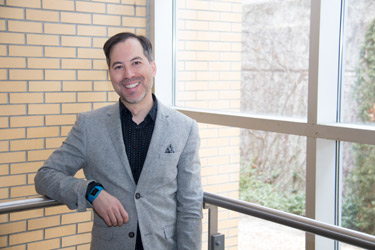Four professors from the Faculty of Liberal Arts & Professional Studies have been inducted by the Royal Society of Canada.
Professor Marie-Christine Pioffet, Department of French Studies, and Professor Leah Vosko, Department of Political Science, became Fellows of the Royal Society of Canada. Professors Kristin Andrews, Department of Philosophy, and Professor Fuyuki Kurasawa, Department of Sociology, were named Members of the College of New Scholars, Artists and Scientists of the Royal Society of Canada.
“I am delighted that the Royal Society of Canada has recognized the range and depth of research and scholarship in LA&PS by honouring Professors Pioffet, Vosko, Andrews and Kurasawa. The accomplishments of each testify to the Faculty’s research leadership in the Humanities and Social Sciences,” says LA&PS Dean Ananya Mukherjee-Reed.
Fellows of the Royal Society of Canada
 Professor Marie-Christine Pioffet is an internationally renowned specialist in 17th-century travel and exploration narratives. Her research on New France radically transformed the scholarly study of explorations, colonization and evangelization in early North America. She has published close to 80 articles and ten books. Her masterful Dictionnaire analytique des toponymes imaginaires (Analytical Dictionary of Imaginary Toponyms in French narrative prose from 1605 to 1711) drew critical attention to the evolution of travel narratives within the wider context of the development of rational thought in the West.
Professor Marie-Christine Pioffet is an internationally renowned specialist in 17th-century travel and exploration narratives. Her research on New France radically transformed the scholarly study of explorations, colonization and evangelization in early North America. She has published close to 80 articles and ten books. Her masterful Dictionnaire analytique des toponymes imaginaires (Analytical Dictionary of Imaginary Toponyms in French narrative prose from 1605 to 1711) drew critical attention to the evolution of travel narratives within the wider context of the development of rational thought in the West.
“What most excites me about research on travel literature and in particular New France texts is to be able to detect, through analysis of texts, the discourse of the Other, for instance that of the Amerindians, who had no voice, since they did not leave any written words,” says Pioffet. “Studying travel accounts of the Old Regime (l’Ancien Régime) and the implications and inferences of the discourse leads me to rethink the history of French colonization in America and in other continents. Contrary to what most travellers are suggesting, the encounters between the French and the local populations did not take place smoothly and without conflict.”
 Professor Leah F. Vosko is an internationally recognized social scientist who writes on the political economy of work, gender, citizenship, migration and labour markets. Her research has had, and continues to have, a profound impact on advancing knowledge about the complex national and global problem of precarious employment. An interdisciplinary scholar, Vosko has shaped innovative approaches to conceptualizing and measuring this phenomenon, to studying labour standards, and to understanding the condition of temporariness. Indeed, her research on precarious employment — and its complex relationships to social relations of gender and citizenship — and her tools for knowledge sharing have had direct and lasting impacts within academe, at the community level, in the public policy arena and on matters of equity and social justice.
Professor Leah F. Vosko is an internationally recognized social scientist who writes on the political economy of work, gender, citizenship, migration and labour markets. Her research has had, and continues to have, a profound impact on advancing knowledge about the complex national and global problem of precarious employment. An interdisciplinary scholar, Vosko has shaped innovative approaches to conceptualizing and measuring this phenomenon, to studying labour standards, and to understanding the condition of temporariness. Indeed, her research on precarious employment — and its complex relationships to social relations of gender and citizenship — and her tools for knowledge sharing have had direct and lasting impacts within academe, at the community level, in the public policy arena and on matters of equity and social justice.
“What motivates much of my current research is the potential to have positive impacts on the lives of workers in precarious jobs,” Vosko says.
Members of the College of New Scholars, Artists and Scientists of the Royal Society of Canada
 Professor Kristin Andrews has been instrumental in developing the field of Philosophy of Animal Minds. Her interdisciplinary work in the philosophy of psychology demonstrates evolutionary continuity between human and other animals in ways that challenge human uniqueness claims based on supposedly human-unique cognitive capacities. This prize-winning research has received international attention among scholars and in the popular press, and has practical policy consequences about how we should treat other species.
Professor Kristin Andrews has been instrumental in developing the field of Philosophy of Animal Minds. Her interdisciplinary work in the philosophy of psychology demonstrates evolutionary continuity between human and other animals in ways that challenge human uniqueness claims based on supposedly human-unique cognitive capacities. This prize-winning research has received international attention among scholars and in the popular press, and has practical policy consequences about how we should treat other species.
“Time and time again we have found that capacities we thought were unique to humans are present in other species. Other animals use tools, comprehend human language, have natural communication systems, develop and spread cultural practices, and can recognize themselves,” says Andrews. “For some theorists, morality now represents the gulf that marks the boundary between humans and other animals; perhaps, they argue, only humans act fairly, cooperate, or engage in third-party punishment. I am currently investigating the origins of normative thinking in other animals, the development of ought-thought in human infants, and the conceptual relationship between ought-thought and full-blown morality.”
 Professor Fuyuki Kurasawa’s pioneering work on the culture and politics of global civil society has contributed substantially to research on cross-cultural analysis, human rights and humanitarian crises, and the impact of new technologies on public understanding of global problems. The recipient of several national and international distinctions, he is an inaugural York Research Chair in Global Digital Citizenship and a sought-after bilingual media analyst.
Professor Fuyuki Kurasawa’s pioneering work on the culture and politics of global civil society has contributed substantially to research on cross-cultural analysis, human rights and humanitarian crises, and the impact of new technologies on public understanding of global problems. The recipient of several national and international distinctions, he is an inaugural York Research Chair in Global Digital Citizenship and a sought-after bilingual media analyst.
“The advent of the digital age has led to two key transformations: an exponential increase in the quantity of available information, which ‘big data’ embodies; and a democratization of participation in generating such information, via social media and crowdsourcing,” says Kurasawa. “While both of these changes are important, what I’m interested in studying is how laypersons and experts, acting as global citizens, are developing norms and practices to determine the quality of information and to recognize certain kinds of knowledge as more valid or truthful than others. This matters because of the current ambiguity surrounding digital processes of creation, evaluation, and dissemination of facts about global problems such as climate change, pandemics, gender-based violence, and humanitarian crises, which is fostering controversies that undermine public understanding of these urgent problems as well as the capacity of civil society actors and formal institutions to tackle them effectively.”
